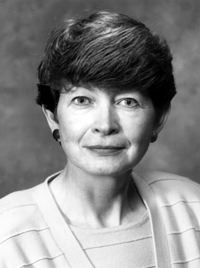October 6, 2011
By Kevin Burns

Teréz Rétfalvi has some unfinished business to attend to. It concerns identity and belonging. A visit to Pier 21 in Halifax in 1991, forty years after her initial arrival there as an immigrant at the age of 6, certainly had something to do with it. “It was very emotional and I was surprised by the intensity of my feelings when I saw the photograph of the ship we arrived on,” she explains with a sudden catch in her voice during our conversation, fully twenty years after that initial visit to the museum.
Another nudge was her first return visit to her parent’s homeland in 1974. She vividly recalls the experience of a door being slammed shut by a member of her family she had never met before. “According to the official records of the Red Cross,” Rétfalvi explains, “the train my parents took in 1945 to escape Hungary and seek refuge in Germany was bombed. But the passengers had been warned somehow and they managed to escape in time through the cornfields.” Officially, however, the young Dr. Rétfalvi, and his wife Maria, then very pregnant with Teréz, and their first-born son were listed as among the dead. So when Teréz Rétfalvi turned up on the Hungarian doorstep of her mother’s sister, who believed her sister’s entire family had been killed on that train 1945, the aunt was overwhelmed. Eventually, her composure recovered, she looked at Teréz studiously and said, “You are Maria’s daughter!”
Once they were established in Canada the family grew. Teréz now has five living siblings. One of her brothers, Andrew (Andor) Jr. died of leukemia in 1962. Her father died in 1989 and five years later she decided to return once more to Hungary. This was during a sabbatical from the University of Moncton where she taught psychology. The journey became to her father’s birthplace became a sort of pilgrimage. “I discovered the village where he grew up, the medical school he attended. I discovered a Hungary that I had only imagined before. It was a beautiful experience to hear that precious musical language of my childhood.”
Conceived in wartime Hungary, born a refugee in Germany, and educated in Canada, Teréz Rétfalvi adapted well to life in Saint-Basile, New Brunswick, before going on to graduate work in psychology at the Université de Moncton and the University of Ottawa. A university professor and clinical psychologist interested in children and families in crisis, Teréz Rétfalvi retired from teaching and as chair of the Comité des études supérieures del’École de psychologie at the University of Moncton in 2007. She still consults on court cases and child advocacy issues and is an Honorary Member of the College of Psychologists of New Brunswick.
As for that unfinished Rétfalvi business, it concerns the complex issue of identity. As she explains, many members of her distant and dispersed family “are now divided, split and all over the place: Romania, Ukraine, Slovakia, Austria. Much of that is to do with Hungarian end-of-empire politics.” Her father, Andor Reisz, was a doctor who specialised in tuberculosis. Unlike his brother, the Jesuit priest Elemér Reisz (1904-1983), Andor changed his surname from the German sounding Reisz to the decidedly Hungarian Rétfalvi. She has subsequently traced the Reisz/Rétfalvi genealogy through several generations but is yet to make progress with her mother’s family: the Balla “tree”.
Rétfalvi says this exploration of “here” and “there” is what grounds her. “My roots are here in Canada. I was educated here, I live here. When I’m here I often think I would prefer to be there. But when I’m in Hungary I soon long to get back here and know that my identity, everything, is here, and not there.”
It was a war that forced her parents to leave “there” and an opportunity “here” that encouraged them to stay. Trained in Hungary, her father was a G.P. and a specialist in tuberculosis. Her mother loved music, especially opera, and would vacuum clean with Wagner blaring in the background, stopping for special moments in the score. She also struggled with bouts of depression. “In Saint-Basile she would dress me like a princess in a washed-and-starched pinafore, my hair braided like someone in a very old photograph. Of course, I was laughed at until I learned to remove that pinafore on my way to school and stuff it in the bottom of my bag until it was time to come home when my mother would want to know why it was so wrinkled.”
As a psychologist, Teréz Rétfalvi knows that a discussion about place is often a conversation about the passage of time. She says listening to classical music helps her as she writes about here and there, and then and now. “It is soothing and liberating and it helps me with what it is I am trying to understand. I just breathe in it.”
